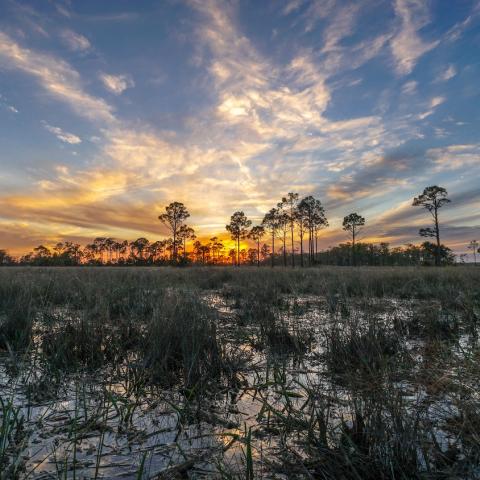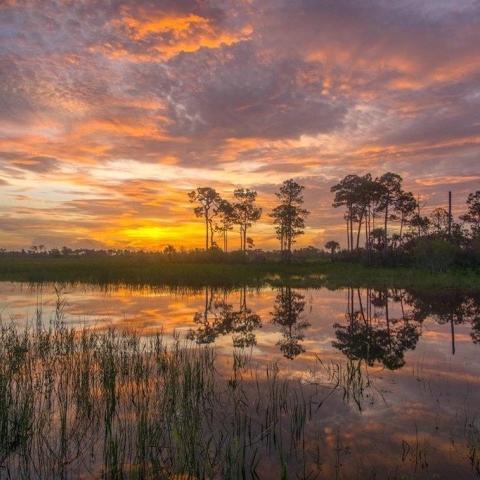Florida officials are being asked to pause the processing of oil drilling permits for Big Cypress National Preserve until all key stakeholders can assess the impacts of Burnett Oil Co.'s search for oil in the preserve and research potential impacts drilling might bring.
“Taxpayers in Florida and around the country have pumped billions of dollars toward restoring the Everglades ecosystem, of which the wetlands of Big Cypress National Preserve are a vital part," Melissa Abdo, the Sun Coast regional director for the National Parks Conservation Association, said Wednesday afternoon. "The preserve has not even begun to heal from the severe impacts of Burnett’s last hunt for oil.
“Our national park sites are carbon sinks, uniquely positioned as one of the first lines of defense against climate change. They should be part of the climate solution, rather than being used to contribute to climate change," she added.
Hugging the northwestern corner of Everglades National Park, Big Cypress has a long history with oil production. The preserve's enabling legislation allowed it, as the federal government owns just the surface rights, not the mineral rights down below. But the preserve also harbors rich and unusual plant and animal life, from rare woodpeckers that live in family groups and endangered wood storks to the ghost orchid, one of the rarest in the world.
Too, it also helps drain roughly 40 percent of the "river of grass" from Lake Okeechobee in central Florida into Florida Bay.
Burnett searched for new deposits in 2017 and 2018, using ponderous 33-ton vibroseis trucks that methodically crisscrossed the survey area, pausing to basically shake the earth to send out seismic signals that geologists could use to identify oil reserves.
While National Park Service officials were pleased with how the company addressed impacts those trucks made to the landscape, conservationists were not. During a trip into the area in March 2020 Abdo pointed out sections of these “seismic lines” that were regaining their vegetative cover, and others bearing rutted troughs unnaturally holding water and impeding the flow of the river of grass; certain sites were practically devoid of vegetation despite the preserve’s subtropical climate and highly diverse botanical collection.
"After witnessing the damage Burnett Oil inflicted with seismic testing, we’ll oppose any efforts to drill in this fragile landscape,” Alison Kelly, senior attorney with Natural Resources Defense Council, said Wednesday. “The Sunshine State should instead focus on climate impacts in Florida, such as sea-level rise, and how to harness its solar energy potential.”
U.S. Army Corps of Engineers officials were conflicted over the impacts; in March 2020 Robert Halbert, chief of the Corps' compliance and enforcement division in Jacksonville, Florida, wrote Burnett to say the exploration work was not conducted in compliance with the Clean Water Act and had adversely affected the preserve's landscape. A month later, Col. Andrew D. Kelly, Jr., the district's commander, overruled Halbert and told Burnett "(G)iven the environmental sensitivity in the Big Cypress National Preserve and your expressed commitment to environmental stewardship, Jacksonville District looks forward to working with you on any future actions to clearly and transparently identify and take the appropriate action on any regulatory requirements and communicate in a professional manner as we aspire to do with every potential applicant."

Though Burnett was required by the Park Service to reclaim its routes taken for oil exploration in 2017 and 2018, this area was struggling to recover in March 2020/Kurt Repanshek
No oil exploration was conducted in Big Cypress last year, and late last month Burnett filed applications seeking clean water permits for drilling operations. While in years past those 404 permits would have had to have been obtained from the federal government, former President Trump saw the authority for those permits transferred to the states.
The groups opposing the drilling -- NPCA, the Natural Resource Defense Council, and Center for Biological Diversity -- question the state's transparency, or lack thereof, in announcing the company's intentions.
"We became aware of these permit applications as a result of an exploratory search of the Department’s new Section 404 permit program database," they wrote in a letter sent Wednesday to the Florida Department of Environmental Protection. "The website itself lists no public notices regarding any Section 404 permit. This lack of transparency is concerning and serves as an example of inadequate public notice under the state Section 404 permit program."
They also pointed out that the transfer of the 404 permitting process to the states was being challenged in federal court.

Groups opposed to drilling for oil in Big Cypress pointed to the impacts past drilling operations and their roads have done. This photo is of drilling operations near Raccoon Point in the preserve/Lighthawk, Jonathan Milne
In their letter (attached below), the groups questioned Burnett's commitment to mitigating damage its work was doing, and might do, to the preserve. In addition to mentioning ruts nearly 2 feet deep and truck trails 15 wide in places from the exploration work, they noted the loss of dwarf cypress trees that were either cut down or runover by the vibroseis trucks

This stump of dwarf cypress tree at Big Cypress National Preserve was spotted in March 2020 in the middle of one of the seismic lines/Kurt Repanshek file
"Despite their small size, dwarf cypress trees can range in age from 31 to 2,500 years. These trees provide important roosting sites and refuge from high water levels for birds and other wildlife. Nonetheless, dwarf cypress trees were cut or run over to make way for the vibroseis vehicles," they noted.
Burnett officials have not responded to a call inquiring about their drilling plans, or to discuss the impacts from exploration. Big Cypress Superintendent Thomas Forsyth said Wednesday that the company still needs to obtain the requisite permits from the state and the National Park Service before it can move forward with its plans.
It was not immediately known whether the Biden administration's moratorium on oil and gas exploration on federal lands applies at Big Cypress, where the mineral rights are privately owned.
"That question is being reviewed at a higher level, but it looks like the (executive order) has to do with federally owned minerals," Forsyth said.
“We refuse to watch this dying industry trash one of Florida’s most important havens for endangered wildlife,” Jaclyn Lopez, Florida director at the Center for Biological Diversity, said Wednesday. “This selfish, shortsighted request to ignore the harm in order to squeeze a few more drops of oil out of a national preserve must be denied.”



 Support Essential Coverage of Essential Places
Support Essential Coverage of Essential Places






